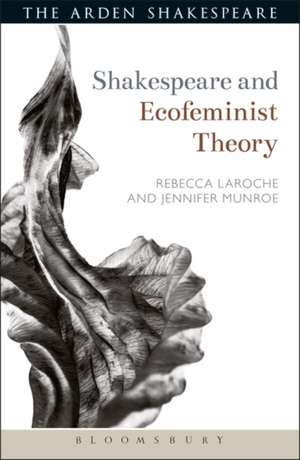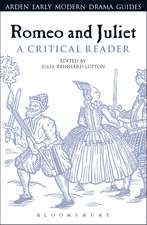Shakespeare and Ecofeminist Theory: Shakespeare and Theory
Autor Jennifer Munroe, Rebecca Larocheen Limba Engleză Paperback – 22 feb 2017
| Toate formatele și edițiile | Preț | Express |
|---|---|---|
| Paperback (1) | 176.86 lei 3-5 săpt. | |
| Bloomsbury Publishing – 22 feb 2017 | 176.86 lei 3-5 săpt. | |
| Hardback (1) | 595.17 lei 6-8 săpt. | |
| Bloomsbury Publishing – 22 feb 2017 | 595.17 lei 6-8 săpt. |
Preț: 176.86 lei
Preț vechi: 206.42 lei
-14% Nou
Puncte Express: 265
Preț estimativ în valută:
33.84€ • 35.33$ • 28.01£
33.84€ • 35.33$ • 28.01£
Carte disponibilă
Livrare economică 14-28 martie
Preluare comenzi: 021 569.72.76
Specificații
ISBN-13: 9781472590459
ISBN-10: 1472590457
Pagini: 216
Dimensiuni: 129 x 198 x 22 mm
Greutate: 0.25 kg
Editura: Bloomsbury Publishing
Colecția The Arden Shakespeare
Seria Shakespeare and Theory
Locul publicării:London, United Kingdom
ISBN-10: 1472590457
Pagini: 216
Dimensiuni: 129 x 198 x 22 mm
Greutate: 0.25 kg
Editura: Bloomsbury Publishing
Colecția The Arden Shakespeare
Seria Shakespeare and Theory
Locul publicării:London, United Kingdom
Caracteristici
Provides
useful
pedagogical
tools
including
glossaries,
suggestions
for
further
reading
and
a
webliography
of
archival
resources
such
as
the
Wellcome
Library's
digital
recipe
book
collection
and
relevant
online
exhibitions
at
the
Folger
Shakespeare
Library
Notă biografică
Rebecca
Larocheis
Professor
of
English
at
the
University
of
Colorado,
Colorado
Springs,
USA.Jennifer
Munroeis
Associate
Professor
of
English
at
the
University
of
North
Carolina
at
Charlotte,
USA.
Cuprins
IntroductionChapter
One:
Ecofeminism
and
the
Seeds
of
Time
Chapter
Two:
The
Undomesticated:
Chinks
in
the
WallChapter
Three:
The
Supernatural:
Revising
Science
Chapter
Four:
The
Inanimate
Chapter
Five:
Archival
and
Other
Sources
/
Further
Reading
ConclusionGlossary
Recenzii
Analysis
of
the
natural
world
(mice,
worms,
plants,
etc.)
and
feminist
issues
(domesticity,
gender,
the
blazon,
body
shaming)
demonstrate
the
necessity
of
an
ecofeminist
approach
in
Shakespeare.
They
also
successfully
situate
ecofeminism
as
a
historically
essential
and
traditionally
ignored
body
of
scholarship,
arguing
that
scholars
who
write
on
race,
class,
and
gender
have
failed
to
cite
ecofeminist
theory
despite
its
decades-long
examination
of
these
concepts
.
Ultimately,
the
authors'
text
offers
hope
for
a
reconciliation
between
what
they
regard
as
unequal
representations
within
these
unities
and
alliances,
giving
ecofeminism
equal
status
in
theoretical
scholarship
and
lifting
it
from
its
subjugated
state.































